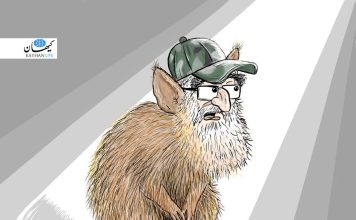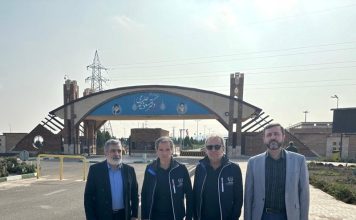Negotiations between Washington and Tehran after the U.S. elections next month will not include Iran’s President Hassan Rouhani or Foreign Minister Javad Zarif, according to Mehdi Khalaji, a fellow at the Washington Institute for Near East Policy in Washington D.C. who made the comment earlier this week in a conference organized by the institute.
The online conference, “An October Surprise With Iran?”, looked at ways in which Iran might stir regional or global conflicts during the upcoming U.S. election, and how the outcome of the election might affect Washington’s policy on Tehran.
The term “October surprise” refers to an unforeseen political development that influences the outcome of an election. The phrase was coined during the U.S. presidential campaign in 1980 pitting Ronald Reagan against Jimmy Carter, when Reagan’s campaign manager, William Casey, discovered that stories published a month before the November vote were influential in altering election outcomes.
[aesop_image img=”https://kayhanlife.com/wp-content/uploads/2019/02/2014-01-22T120000Z_170710089_LR2EA1M193RJN_RTRMADP_3_DAVOS.jpg” panorama=”off” credit=”REUTERS/Denis Balibouse ” align=”center” lightbox=”off” captionsrc=”custom” caption=”FILE PHOTO: Iran’s President Hassan Rouhani (R) and Iran’s Foreign Minister Mohammad Javad Zarif arrive for a meeting during the annual meeting of the World Economic Forum (WEF) in Davos January 22, 2014. ” captionposition=”left” revealfx=”off” overlay_revealfx=”off”]
In the November elections, U.S. President Donald Trump is hoping to secure a second term in office and is likely to double down on his Maximum Pressure Campaign against Iran, while his Democratic opponent Joe Biden will, according to analysts, seek to revive the Iran nuclear deal, or rejoin the Joint Comprehensive Plan of Action (JCPOA), and bring Iran back to the negotiating table.
During the webinar, Khalaji predicted that Iran’s Supreme Leader would change his negotiation team — which currently includes Rouhani and Zarif — before reopening talks with the United States. He said the Supreme Leader was unhappy with Rouhani and Zarif because of their management of the economic crisis and of a “fragile Iranian society” reeling from Covid-19.
“Negotiation with the U.S. has become inevitable for Iran. No matter who wins the election in the U.S. or who wins the presidential election next year in Iran, there will be serious negotiations between Iran and the United States,” he added.
The other two speakers in the webinar were Ariane Tabatabai, the Middle East fellow at the Washington-based German Marshall Fund’s Alliance for Securing Democracy, and Michael Eisenstadt, a Kahn fellow at the Washington Institute and director of its military and security studies program. The event was chaired by Barbara Leaf, the former U.S. ambassador to the United Arab Emirates and acting director of the Geduld program on Arab politics at the Washington Institute.
Addressing a question from Barbara Leaf about Iran’s appetite for risk taking ahead of the U.S. elections, Tabatabai said Tehran was trying to strike a balance in its strategy towards the U.S. to avoid confrontation.
“Iran is happy to sit back and wait and see what happens in our elections. To my mind, the chief objective is to preserve the status quo, and to continue to maintain a certain amount of pressure on the United States, while trying to avoid rather than provoke an October surprise,” she said.
Washington’s Maximum Pressure strategy against the Islamic Republic has included punishing sanctions on Iran’s financial, oil and industrial sectors, and has targeted key figures inside the regime.
Michael Eisenstadt said Tehran was trying to disrupt that campaign through its own counter-pressure campaign. Listing Tehran’s four retaliation tools –— attacks on oil transport and infrastructure in the Middle East, Iran proxy attacks in Iraq, uranium enrichment in breach of the JCPOA, and global cyber attacks against opposing states — Eisenstadt said he believed, like Tabatabai, that Tehran was now adopting a policy of ‘watch and wait.’
“The goal was to get the U.S. to ease or lift sanctions while inducing the Europeans to ignore them, and [Iran has] really failed in this regard so far. With so little time before the American elections, they realized it was unlikely they would make any progress towards achieving the goals of the counter-pressure campaign, so now the goal is either to not derail the elections, or to influence them. Revenge takes a second seat to strategy,” he said.
All three speakers agreed that Iran wanted to show the U.S. its strength ahead of any negotiations between the two countries.
On Iran returning to the negotiating table, Tabatabai said, “To me it is clear that Iran wants to demonstrate that it has tools at its disposal, that it too can pressure the United States, that the Maximum Pressure Campaign is not a one-sided effort and that when it comes to negotiating, it is going to want to get some bargaining chips ahead of time.”
The panelists also said it was impossible to predict what a policy towards Iran might look like after the elections. According to Khalaji, “Everything depends on who will win the U.S. election and what the design strategy for future negotiations with Iran will be.”







